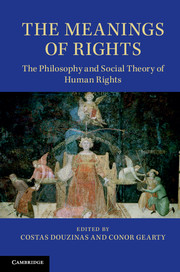Book contents
- Frontmatter
- Contents
- Notes on contributors
- Introduction
- Part I Finding foundations
- 1 On human rights: two simple remarks
- 2 Human rights: the necessary quest for foundations
- 3 Against human rights: liberty in the western tradition
- 4 Religious faith and human rights
- Part II Law, rights and revolution
- Part III Rights, justice, politics
- Part IV Rights and power
- Index
1 - On human rights: two simple remarks
Published online by Cambridge University Press: 05 June 2014
- Frontmatter
- Contents
- Notes on contributors
- Introduction
- Part I Finding foundations
- 1 On human rights: two simple remarks
- 2 Human rights: the necessary quest for foundations
- 3 Against human rights: liberty in the western tradition
- 4 Religious faith and human rights
- Part II Law, rights and revolution
- Part III Rights, justice, politics
- Part IV Rights and power
- Index
Summary
First remark
Today, political correctness demands that we say in French droits humains (human rights) when we used to say droits de l’homme (rights of man). This demand, which also occurs in other areas, is made because the French homme, like ‘man’ in English, does not distinguish between the human race and the male gender. German is better equipped, differentiating between Mensch and Mann. Latin distinguishes between vir and homo, Greek between anêr and anthrōpos, etc.
We could discuss the reasons for this. However, it is also important to note the introduction of another ambiguity. The adjective ‘human’ in French has a value that corresponds to the usual meaning we now give to the term ‘humanist’ and, more generally, to the moral qualities of ‘care’ (a word which has recently been imported unchanged from English into French), ‘compassion’ or ‘charity’. The English language attributes this value to the word ‘human’, further ascribing to it a more specific term, ‘humane’. German has introduced, along with menschlish, the words human, humanitär, and Humanität as terms of ethical evaluation. In other words, human rights can be seen as rights basking in the aura of humanity, since this term, in its currently impoverished and rather ridiculous sense, has taken on the meaning of a ‘love of mankind’ or ‘friendship’ (in French, this is the meaning frequently ascribed to philia). Now philanthropy – which was actually a secular displacement of the ostensibly all-too-Christian charity – is based upon a more or less hidden axiom of condescension: it is the act of the rich, cultivated and dominant, who feel benevolence, compassion and pity for the social misfortune of others. For all that, philanthropists have never sought to challenge the social order, except in minor ways.
- Type
- Chapter
- Information
- The Meanings of RightsThe Philosophy and Social Theory of Human Rights, pp. 15 - 20Publisher: Cambridge University PressPrint publication year: 2014
- 1
- Cited by



